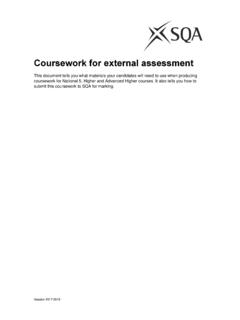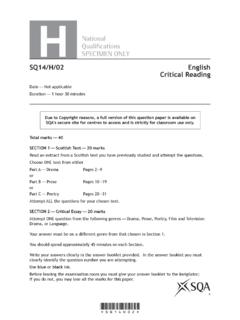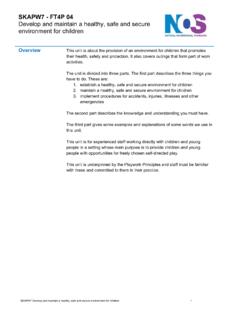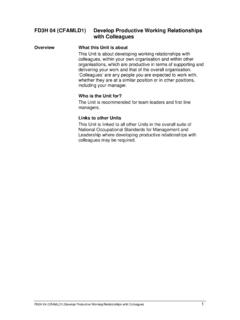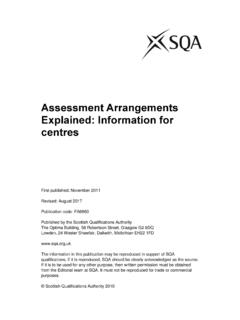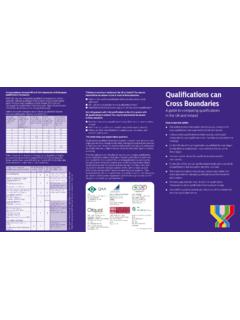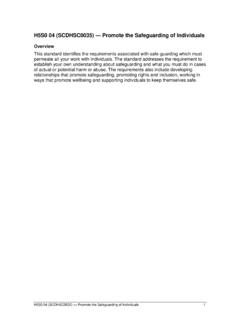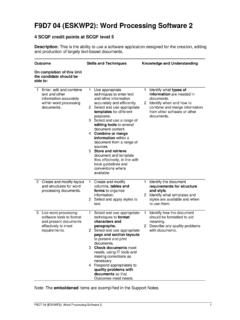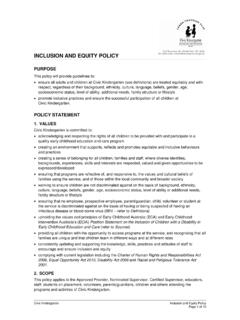Transcription of National 5 Business Management - SQA
1 National 5 Business Management Course code: C810 75. Course assessment code: X810 75. SCQF: level 5 (24 SCQF credit points). Valid from: session 2017 18. The course specification provides detailed information about the course and course assessment to ensure consistent and transparent assessment year on year. It describes the structure of the course and the course assessment in terms of the skills, knowledge and understanding that are assessed. This document is for teachers and lecturers and contains all the mandatory information you need to deliver the course. This edition: June 2017, version Scottish Qualifications Authority 2012, 2017.
2 Contents Course overview 1. Course rationale 2. Purpose and aims 2. Who is this course for? 3. Course content 4. Skills, knowledge and understanding 4. Skills for learning, skills for life and skills for work 8. Course assessment 9. Course assessment structure: question paper 9. Course assessment structure: assignment 10. Grading 13. Equality and inclusion 14. Further information 15. Appendix: course support notes 16. Introduction 16. Developing skills, knowledge and understanding 16. Approaches to learning, teaching and assessment 17. Preparing for course assessment 30. Developing skills for learning, skills for life and skills for work 30.
3 Course overview The course consists of 24 SCQF credit points which includes time for preparation for course assessment. The notional length of time for a candidate to complete the course is 160 hours. The course assessment has two components. Component Marks Duration Component 1: question paper 90 2 hours Component 2: assignment 30 5 hours see course assessment section Recommended entry Progression Entry to this course is at the discretion of the Higher Business Management course centre. other qualifications in Business Management or related areas Candidates should have achieved the fourth further study, employment, and/or curriculum level or the National 4 Business training course or equivalent qualifications and/or experience prior to starting this course.
4 Conditions of award The grade awarded is based on the total marks achieved across all course assessment components. Version 1. Course rationale National Courses reflect Curriculum for Excellence values, purposes and principles. They offer flexibility, provide more time for learning, more focus on skills and applying learning, and scope for personalisation and choice. Every course provides opportunities for candidates to develop breadth, challenge and application. The focus and balance of assessment is tailored to each subject area. Business plays an important role in society, as it creates wealth, prosperity, jobs and choices. It is therefore essential to have effective businesses and Business managers to sustain this role.
5 The National 5 Business Management course helps candidates develop an understanding of the economic and financial environment in which businesses operate. This enables them to make an effective contribution to society as consumers, employees, employers or self-employed people. Candidates gain skills in personal financial awareness through improving knowledge of financial Management in a Business context. The course introduces candidates to the dynamic, changing, competitive, and economic environment of industry and commerce. It develops skills in communicating and presenting Business -related information, in a variety of formats, to the various stakeholders of an organisation.
6 By studying this course, candidates develop an appreciation of customer focus, enterprise, and decision-making. Purpose and aims The course highlights ways in which organisations operate and the steps they take to achieve their goals. It enables candidates to understand and make use of Business information to interpret and report on overall Business performance, in a range of contexts. The course enables candidates to develop: knowledge and understanding of the ways in which society relies on Business to satisfy needs and wants an insight into the systems organisations use to ensure customers' needs are met enterprising skills and attributes financial awareness, in a Business context an insight into how organisations organise their resources for maximum efficiency and to improve their overall performance an awareness of how external influences impact on organisations Version 2.
7 Who is this course for? This course is suitable for learners who are interested in entering the world of Business and exploring the activities of different types of Business . Version 3. Course content The course comprises five areas of study: Understanding Business Candidates are introduced to the Business environment while developing skills, knowledge and understanding of enterprise, and the role of different types of Business organisations in society. They also learn about the internal and external environments in which organisations operate, and the role of stakeholders in Business . Management of marketing Candidates develop skills, knowledge and understanding of the importance to organisations of having effective marketing systems.
8 They learn about the processes and procedures organisations use to maintain competitiveness, and how marketing can be used to communicate effectively with consumers, maximising customer satisfaction. Management of operations Candidates develop skills, knowledge and understanding of the importance to organisations of having effective operations systems. They learn about the processes and procedures used to maintain quality through the effective Management of suppliers, inventory, and methods of production in an ethical manner. Management of people Candidates develop skills, knowledge and understanding of the issues facing organisations when managing people.
9 They learn about the theories, concepts and processes relating to human resource Management , and how employees contribute to the success of organisations. Management of finance Candidates develop skills, knowledge and understanding of the issues facing organisations when managing finance. They learn about the basic theories, concepts and processes relating to financial aspects of Business , when preparing and interpreting information to solve financial problems facing organisations. Skills, knowledge and understanding Skills, knowledge and understanding for the course The following provides a broad overview of the subject skills, knowledge and understanding developed in the course: knowledge and understanding of the impact of Business activities on society, in contexts which have some complex features decision-making by applying the ideas of ethical and effective Business decisions to solve straightforward Business -related problems Version 4.
10 Communicating straightforward Business ideas, opinions and information relating to the effects of internal and external factors on Business activity knowledge and understanding of how enterprising skills can help in Business development understanding how to enhance employability skills knowledge and understanding of the contribution of staff to Business success interpreting and evaluating straightforward Business financial data to ensure effective financial Management analysing the effectiveness of a limited range of marketing activities, and understanding how they can be used to enhance customer satisfaction evaluating a range of production techniques used to maximise the quality of goods/services basic knowledge of using existing and emerging technologies in current Business practice Skills, knowledge and understanding for the course assessment The following provides details of skills, knowledge and understanding sampled in the course assessment.
